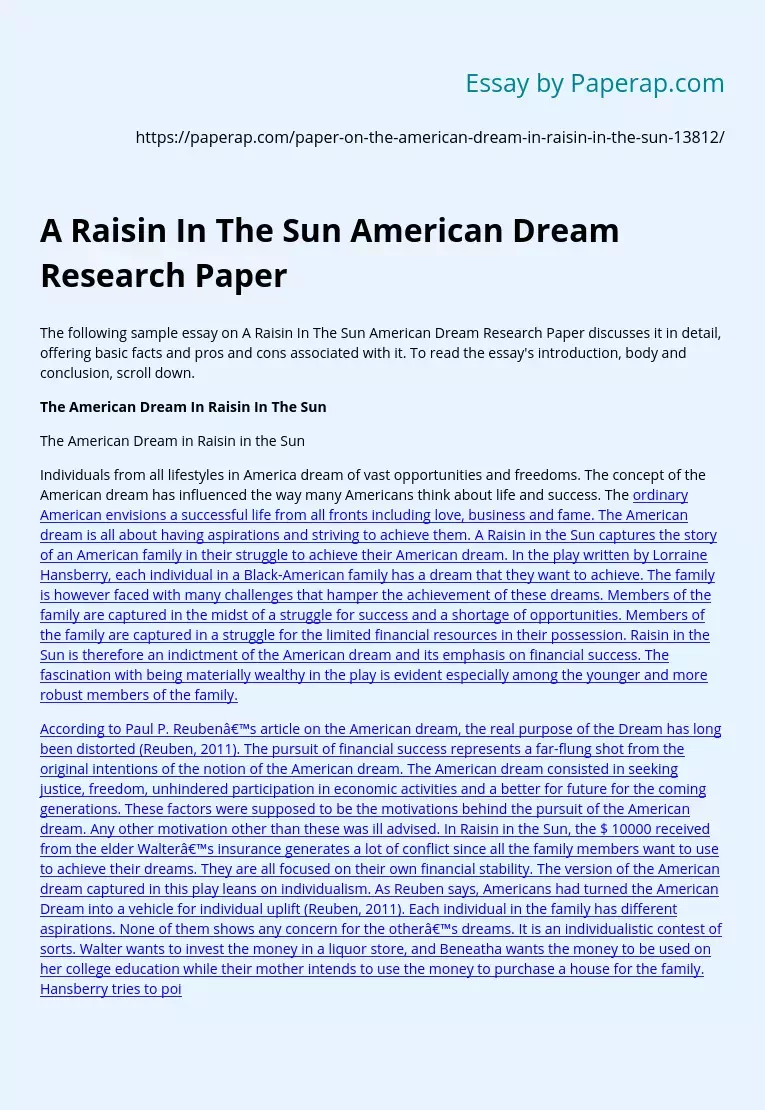A Raisin In The Sun American Dream Research Paper
The following sample essay on A Raisin In The Sun American Dream Research Paper discusses it in detail, offering basic facts and pros and cons associated with it. To read the essay’s introduction, body and conclusion, scroll down.
The American Dream In Raisin In The Sun
The American Dream in Raisin in the Sun
Individuals from all lifestyles in America dream of vast opportunities and freedoms. The concept of the American dream has influenced the way many Americans think about life and success.
Members of the family are captured in the midst of a struggle for success and a shortage of opportunities. Members of the family are captured in a struggle for the limited financial resources in their possession. Raisin in the Sun is therefore an indictment of the American dream and its emphasis on financial success. The fascination with being materially wealthy in the play is evident especially among the younger and more robust members of the family.
According to Paul P. Reuben’s article on the American dream, the real purpose of the Dream has long been distorted (Reuben, 2011).
The pursuit of financial success represents a far-flung shot from the original intentions of the notion of the American dream. The American dream consisted in seeking justice, freedom, unhindered participation in economic activities and a better for future for the coming generations. These factors were supposed to be the motivations behind the pursuit of the American dream. Any other motivation other than these was ill advised. In Raisin in the Sun, the $ 10000 received from the elder Walter’s insurance generates a lot of conflict since all the family members want to use to achieve their dreams. They are all focused on their own financial stability. The version of the American dream captured in this play leans on individualism. As Reuben says, Americans had turned the American Dream into a vehicle for individual uplift (Reuben, 2011). Each individual in the family has different aspirations. None of them shows any concern for the other’s dreams. It is an individualistic contest of sorts. Walter wants to invest the money in a liquor store, and Beneatha wants the money to be used on her college education while their mother intends to use the money to purchase a house for the family. Hansberry tries to point out this misunderstanding of the American dream and its possible effects on the original motives of the American dream. He uses Walter to portray this skewed version of the American dream.
In a Raisin in the Sun, Hansberry criticizes the American dream by using Walter’s misunderstanding of the notion. Hansberry tries to reflect on how important the aspects of freedom and a better life are compared to financial wealth. She highlights the evident changes that have occurred in the understanding of the American Dream. Walter envies Charlie Atkins because he owns a dry-cleaning business that is performing quite well. Walter embodies a classic form of the American dream, the fascination with material wealth. In fact, Walter tells his mother that money is life and that there was a time when freedom and other fundamental needs were life, but that has long changed (Hansberry 74). The author understands how much the notion has been distorted and tries to show how much freedom, economic participation and a better future for the children had been overshadowed by material wealth. Walter is determined to see his dreams fulfilled and will stop at nothing to gain wealth. He refuses to heed his mother’s attempts to stop him from investing in the liquor shop. Because of this obsession with wealth, he refuses to listen to Ruth’s advice on the honesty of his business partner.
Since its inception, the American dream was not a dream of wealth and economic betterment but a dream of a better life for everyone, diverse opportunities to those who are able and overall social order. Hansberry in the play mocks this notion. From her perspective, certain circumstances make it difficult to achieve the American Dream. Walter, for example, meets racial prejudice, discrimination and poverty in his quest for success. These factors hinder his pursuit of the American dream. The play shows how some factors in the environment one lives in can make achievement of the American Dream impossible. Walter lacks the money to make his investment in the liquor store. In the play, the Younger family as a whole aspires to gain wealth and acceptance in the white society. This represents the distorted and misunderstood version of the American dream. While gaining acceptance in white society is a viable semblance of the American dream, financial success is not. The Raisin in the Sun identifies the most significant factor of the American dream today that has overshadowed the other more fundamental issues. The inability of the country to provide opportunities for even the less privileged to pursue their dreams is a failing of the American dream. People like Walter and Beneatha find it difficult to succeed because the available conditions do not favor them.
Hansberry reveals the enormous challenges facing the less privileged in achieving the American dream. According to Raisin in the Sun, priorities have shifted from those that want to achieve social order to individualistic motives. Perhaps, what she wants to put across is that the American dream regenerated into one served by materialistic motives. Americans are increasingly being driven by material concerns rather than the pursuit of individual freedoms and privileges.
Works Cited
Hansberry, Lorraine. A Raisin in the Sun. London: Methuen Drama, 2011. Print.
Reuben, Paul P. “PAL: Appendix S: The American Dream.” PAL: Perspectives in American Literature- A Research and Reference Guide, 10 Nov. 2011. Web. 18 April. 2013. Available <http://www.csustan.edu/english/reuben/pal/append/axs.html>
A Raisin In The Sun American Dream Research Paper. (2019, Dec 06). Retrieved from https://paperap.com/paper-on-the-american-dream-in-raisin-in-the-sun-13812/

